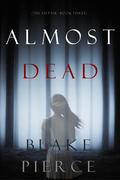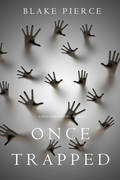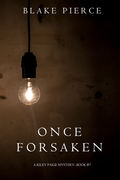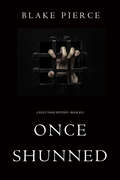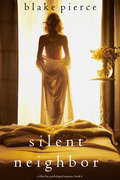
Блейк Пирс
The Perfect Block
CHAPTER SIX
The club was loud and dark and Jessie could feel a headache coming on.
An hour ago, when she and Lacy had been getting ready, things seemed much more promising. Her roommate’s enthusiasm was infectious and she found herself almost looking forward to the evening as they put on their dresses and did their hair.
When they left the apartment, she couldn’t say she disagreed with Lacy’s contention that she looking “smokin’ hot.” She was wearing her red skirt with the slit up the thigh, the one she never got to bust out in her brief but tumultuous Orange County suburban existence. She wore a black sleeveless top that accentuated the muscle tone she’d developed during physical therapy.
She even deigned to put on a pair of three-inch black pumps that officially put her over six feet and in the Amazon woman club alongside Lacy. Originally she wore her brown hair up but her fashion impresario roommate convinced her to let it down, so that it cascaded past her shoulders to her upper back. Looking in the mirror, she didn’t think it was totally ridiculous when Lacy said they looked like a couple of models slumming for the evening.
But an hour later her mood had soured. Lacy was having a great time, playfully flirting with guys she wasn’t interested in and seriously flirting with girls that she was. Jessie found herself at the bar talking to the bartender, who was obviously well practiced in entertaining girls not used to the scene.
She wasn’t sure when she’d gotten so lame. It was true that she hadn’t really been single in nearly a decade. But she and Kyle had gone out to exactly these kinds of clubs back when they lived here, before the move to Westport Beach. She had never felt out of place.
In fact, she used to love to check out new downtown L.A.—DTLA to locals—clubs, bars, and restaurants, a few of which seemed to open every week. The two of them would swoop in and take over the place, trying the most unconventional menu item or drink, dancing goofily in the center of the club, oblivious to the dubious glances they got. She didn’t miss Kyle but she had to admit she longed for the life they’d shared together before everything went sideways.
A young guy, likely not older than twenty-five, sidled up next to her and eased onto the empty bar stool to her left. She gave him the once-over in the bar mirror, quietly sizing him up.
It was part of a private game she liked to play with herself. She informally called it “People Prediction.” In it, she would try to guess as much about a person’s life as possible, based only on how they looked, acted, and spoke. As she surreptitiously gave the guy a sideways glance, she was delighted to realize that the game now had professional benefits. After all, she was a junior, interim criminal profiler. This was fieldwork.
The guy was moderately attractive, with shaggy, dirty-blond hair that swept down over the right side of his forehead. He was tan, but not in a beachy kind of way. It was too even and perfect. She suspected he visited a tanning salon periodically. He was in good shape but looked almost unnaturally lean, like a wolf that hadn’t eaten in a while.
He’d clearly come from work, as he was still in “the uniform”—suit, shiny shoes, slightly loosened tie to show he was in relaxed mode. It was approaching 10 p.m. and if he was only just getting off work, it suggested he worked a job that required long office hours. Maybe finance, though that usually meant early starts more than late nights.
He was more likely a lawyer. Not for the government though; maybe an associate in his first year at some fancy firm in a nearby high rise where they were working him to death. He was well-paid, as the tailored suit proved. But he didn’t have much time to enjoy the fruits of his labor.
He seemed to be deciding what line to use on her. He couldn’t offer her a drink as she already had one that was still half full. Jessie decided to give him a hand.
“What firm?” she asked, turning to face him.
“What?”
“What legal firm are you with?” she repeated, nearly shouting to be heard over the pulsating music.
“Benson & Aguirre,” he answered in an East Coast accent she couldn’t quite identify. “How did you know I was a lawyer?”
“Lucky guess; looks like they’re really working you to the bone. You just get off?”
“About a half hour ago,” he said, his voice betraying a tone more Mid-Atlantic than New York. “I’ve been looking forward to a drink for about three hours now. I could really go for a water ice but this’ll have to do.”
He took a swig from his bottle of beer.
“How does L.A. compare to Philadelphia?” Jessie asked. “I know it’s been less than six months but do you feel like you’re adjusting okay?”
“Jeez, what the hell? Are you some kind of private detective? How do you know I’m from Philly and that I only moved here in August?”
“It’s kind of a talent I have. I’m Jessie, by the way,” she said, extending her hand.
“Doyle,” he said, shaking it. “Are you gonna tell me how you do that parlor trick? Because I’m kind of freaking out over here.”
“I wouldn’t want to spoil the mystery. Mystery’s very important. Let me ask one more question, just to complete the picture. Did you go to Temple or Villanova for law school?”
He stared at her with his mouth agape. After blinking a few times, he regrouped.
“How do you know I didn’t go to Penn?” he asked, feigning insult.
“Nah, you didn’t order any water ices at Penn. Which is it?”
“’Nova all the way, baby!” he shouted. “Go Wildcats!”
Jessie nodded appreciatively.
“I’m a Trojan girl myself,” she said.
“Oh, jeez. You went to USC? Did you hear about that Lionel Little guy—former ball player there? He got killed today.”
“I heard,” Jessie said. “Sad story.”
“I heard he was killed for his shoes,” Doyle said, shaking his head. “Can you believe that?”
“You should take care of yours, Doyle. They don’t look cheap either.”
Doyle glanced down, then leaned over and whispered in her ear, “Eight hundred bucks.”
Jessie whistled in fake awe. She was fast losing interest in Doyle, whose youthful exuberance was starting to be overwhelmed by his youthful self-satisfaction.
“So what’s your story?” he asked.
“You don’t want to try to guess?”
“Oh man, I’m not so good at that.”
“Give it a try, Doyle,” she coaxed. “You might surprise yourself. Besides, a lawyer needs to be perceptive, right?”
“That’s true. Okay, I’ll give it a shot. I’d say you’re an actress. You’re pretty enough to be one. But DTLA isn’t really actress territory. That’s more like Hollywood and points west. Model maybe? You could be. But you seem too smart to have that be your main thing as like, a career. Maybe you did some modeling as a teenager but now you’re into something more professional. Oh, I’ve got it, you’re in public relations. That’s why you’re so good at reading people. Am I right? I know I am.”
“Really close, Doyle. But not quite.”
“So what do you do then?” he demanded.
“I’m a criminal profiler with the LAPD.”
It felt good to say it out loud, especially as she watched his eyes widen in shock.
“Like that show Mindhunter?”
“Yeah, kind of. I help the police get inside the heads of criminals so they have a better chance of catching them.”
“Whoa. So do you hunt serial killers and stuff?”
“For a while now,” she said, neglecting to mention that her search was for one particular serial killer and that it had nothing to do with work.
“That’s awesome. What a cool job.”
“Thanks,” Jessie said, sensing that he’d finally built up the courage to ask what had been on his mind for a while now.
“So what’s your deal? Are you single?”
“Divorced actually.”
“Really?” he said. “You seem too young to be divorced.”
“I know, right? Unusual circumstances. It didn’t pan out.”
“I don’t want to be rude but can I ask—what was so unusual? I mean, you seem like a catch. Are you a psycho or something?”
Jessie knew he didn’t mean any harm with the question. He was genuinely interested in both the answer and in her and he’d just fumbled it horribly. Still, she could feel all her remaining interest in Doyle drain from her at that moment. In the same instant, the weight of the day and the discomfort of her high heels reared their heads. She decided to close out the evening with a bang.
“I wouldn’t call myself a psycho, Doyle. I’m definitely damaged, to the point of waking up screaming most nights. But psycho? I wouldn’t say that. Mostly we got divorced because my husband was a sociopath who murdered a woman he was sleeping with, attempted to frame me for it, and ultimately tried to kill me and two of our neighbors. He really embraced the ‘death do us part’ thing.”
Doyle stared at her, his mouth so wide it could have caught flies. She waited for him to recover, curious to see how smoothly he’d extricate himself. Not very, as it turned out.
“Oh, that really sucks. I would ask more about it but I just remembered I have an early deposition tomorrow. I should probably get home. Hope to see you around some time.”
He was off the stool and halfway to the door before she could get out a “Bye, Doyle.”
*
Jessica Thurman pulled the blanket up to cover her half-freezing little body. She’d been alone in the cabin with her dead mother for three days now. She was so delirious from lack of water, warmth, and human interaction that sometimes she thought her mother was talking to her, even as her corpse slumped, unmoving, her arms held in the air by manacles attached to the wooden roof beams.
Suddenly there was banging on the door. Someone was just outside the cabin. It couldn’t be her father. He had no reason to knock. He entered whatever place he wanted whenever he wanted.
The banging came again, only this time it sounded different. There was a ringing sound mixed in. But that made no sense. The cabin didn’t have a doorbell. The ringing came again, this time without any knocking at all.
Suddenly Jessie’s eyes popped open. She lay there in bed, allowing her brain a second to process that the ringing she’d heard had come from her cell phone. She leaned over to grab it, noting that while her heart was pumping fast and her breathing was shallow, she wasn’t as sweaty as usual in the aftermath of a nightmare.
It was Detective Ryan Hernandez. As she answered the call, she glanced at the time: 2:13 a.m.
“Hello,” she said, with almost no grogginess in her voice.
“Jessie. It’s Ryan Hernandez. Sorry to call at this hour but I got a call to investigate a suspicious death in Hancock Park. Garland Moses doesn’t do middle of the night calls anymore and everyone else is already spoken for. You up for it?”
“Sure,” Jessie replied.
“If I text you the address, can you be here in thirty minutes?” he asked.
“I can be there in fifteen.”
CHAPTER SEVEN
When Jessie pulled up in front of the mansion on Lucerne Blvd. at 2:29 a.m., there were already multiple police cars, an ambulance, and a medical examiner’s vehicle out front. She got out and walked toward the front door, trying to look as professional as possible under the circumstances.
Neighbors stood on the sidewalk, many wrapped up in robes to protect against the chill of the night. This sort of thing wasn’t typical for a wealthy neighborhood like Hancock Park. Nestled between Hollywood to the north and the Mid-Wilshire district to the south, it was an enclave of old money Los Angeles; or at least as “old money” as anything in a city so unconcerned with historical tradition could be.
The people who lived here weren’t so much the movie stars or Hollywood moguls one might find in Beverly Hills or Malibu. These were the homes of the generationally wealthy, who might or might not actually work. If they did, it was often merely to avoid boredom. But they didn’t have to worry about being bored tonight. After all, one of their own was dead and everyone was curious as to who.
Jessie felt a bit of thrill as she walked up the stairs to the front door, which was marked off with yellow police tape. This was the first time she’d arrived at a crime scene unaccompanied by a detective. And that meant it was the first time she’d have to show her credentials to access a restricted area.
She remembered being so excited when she’d first gotten them. She even practiced flashing them to Lacy a few times back at the apartment. But now, as she fumbled through her coat pocket, trying to find them, she felt surprisingly nervous.
She needn’t have been. The officer at the top of the stairs barely glanced at them as he pulled back the police tape and let her pass.
Jessie found Hernandez and another detective standing just inside the foyer of the house. The younger man looked like he’d drawn the short straw. Detective Reid’s seniority must have allowed him to beg off this call. Jessie wondered why Hernandez hadn’t pulled rank too. He saw her and waved her in.
“Jessie Hunt, I don’t know if you’ve met Detective Alan Trembley. He was the detective on call tonight and he’ll be working the case with me.”
As Jessie shook his hand, she couldn’t help but notice that, with his unkempt curly blond hair and glasses halfway down the bridge of his nose, he looked as scattered as she felt.
“Our victim is in the pool house,” Hernandez said as he started walking, leading the way. “Her name is Victoria Missinger. Thirty-four years old. Married. No children. She’s in a small, hidden nook off the main room, which may help explain why it took so long to find her. Her husband called in this afternoon, saying he hadn’t been able to reach her for hours. There was some concern that it might have been a ransom situation so a full house search wasn’t done until a few hours ago. Her body was found by a cadaver dog.”
“Jesus,” Trembley muttered under his breath, making Jessie wonder just how experienced he was to be set off by the notion of a cadaver dog.
“How did she die?” she asked.
“The M.E. is still on sight and no blood work has been done yet. But the initial theory is an insulin overdose. A needle was found near the body. She was a diabetic.”
“You can die from an insulin overdose?” Trembley asked.
“Sure, if left untreated,” Hernandez said as they walked down a long hallway of the main house toward the back door. “And it looks like she was alone in the room for hours.”
“We seem to be dealing with a lot of needle-related incidents lately, Detective Hernandez,” Jessie noted. “You know, I am willing to handle a shooting now and then.”
“Purely coincidence, I assure you,” he replied, smiling.
They stepped outside and Jessie realized that the massive house in front hid an even larger backyard. An enormous pool took up half the space. Beyond that sat the pool house. Hernandez headed that way and the other two followed.
“What makes you suspect it wasn’t just an accident?” Jessie asked him.
“I haven’t drawn any conclusions yet,” he answered. “The M.E. will be able to tell us more in the morning. But Mrs. Missinger has had diabetes all her life and, according to her husband, she’s never had an accident like this before. It sounds like she knew how to take care of herself.”
“Have you spoken to him yet?” Jessie asked.
“No,” Hernandez replied. “A uniformed officer took his initial statement. He’s currently being babysat in the breakfast room. We’ll talk to him after I show you the scene.”
“What do we know about him?” Jessie asked.
“Michael Missinger, thirty-seven years old. Scion of the Missinger oil fortune. He sold his interest seven years ago and started a hedge fund that invests exclusively in environmentally friendly technologies. He works downtown in the penthouse of one of those buildings you have to crane your neck to see the top of.”
“Any priors?” Trembley asked.
“Are you kidding?” Hernandez scoffed. “On paper, this guy is as straight as arrows come. No personal scandals. No financial issues. Not even a traffic ticket. If he’s got secrets, they’re well hidden.”
They had arrived at the pool house. A uniformed officer pulled back the police tape so they could enter. Jessie followed Hernandez, who took the lead. Trembley brought up the rear.
As she stepped inside, Jessie tried to clear her head of all extraneous thought. This was her first high-profile potential murder case and she didn’t want any distractions pulling her from the job at hand. She wanted to focus exclusively on her surroundings.
The pool house was all understated, old-world glamour. It reminded her of the cabanas she imagined movie stars from the 1920s would use when they visited the beach. The long couch at the back of the main room had a wood frame but luxurious cushions that looked extremely nap-friendly.
The coffee table appeared to have been hand-crafted from reclaimed wood, some of which looked to be old sections of boat hulls. The art on the walls looked to be Polynesian in origin. In the far corner of the room was a bumper pool table. The flat-screen TV was hidden behind a thick, silky-looking beige curtain that Jessie suspected might have cost more than her Mini Cooper out front. There was no sign that anything untoward had happened in here.
“Where’s the hidden nook?” she asked.
Hernandez led them past the bar that ran along the near wall. Jessie saw more police tape in front of what looked like a linen closet. Hernandez peeled it back and opened the closet door with a gloved hand. Then he stepped inside and seemed to disappear.
Jessie followed and saw that the closet did indeed have shelves with towels and some cleaning products. But as she got closer, she saw a narrow opening to the right between the door and the shelves. There appeared to be a sliding wooden door that receded into the wall.
Jessie put on a pair of gloves of her own and pulled the door closed. To an undiscerning eye, it looked like just another panel in the wall. She slid it open again and stepped inside the small room where Hernandez stood waiting.
There wasn’t much to it—just a little loveseat and a small wooden table beside it. On the floor was a lamp that had apparently been knocked over. Some shards had broken off and settled onto the plush white carpeting.
Slumped on the loveseat in a relaxed pose that could easily be mistaken for sleeping was Victoria Missinger. A needle rested on the cushion beside her.
Even in death, Victoria Missinger was a beautiful woman. It was hard to gauge her height but she was trim, with the look of a woman who met regularly with her trainer. Jessie made a mental note to follow up on that.
Her skin was creamy and vibrant, even as rigor mortis was setting in. Jessie could only imagine what it was like when she was alive. She had long blonde hair that covered part of her face, but not enough to obscure her perfect bone structure.
“She was pretty,” Trembley said, understating it.
“Do you think there was a struggle?” Jessie asked Hernandez, nodding at the broken lamp on the carpet.
“Hard to be sure. She could have just bumped it trying to get up. Or it could mean there was a tussle of some kind.”
“I feel like you have an opinion but are holding back,” Jessie pressed.
“Well, as I said, I hate to draw conclusions too early. But I found this a little odd,” he said, pointing at the carpet.
“What?” she asked, unable to discern anything notable other than how thick the carpeting was.
“You see how deep the indentations in the carpet are from our footsteps?”
Jessie and Detective Trembley nodded.
“When we first came in after the dog found her, there were no footprints at all.”
“Not even hers?” Jessie asked, starting to figure it out.
“Nope,” Hernandez answered.
“What does that mean?” Trembley asked, not getting it yet.
Hernandez filled him in.
“It means that either the luxurious carpeting in here has unprecedented bounce-back capabilities or someone vacuumed it after the fact to hide the existence of footprints other than Victoria’s.”
“That’s interesting,” Jessie said, impressed by Detective Hernandez’s attention to detail. She prided herself on reading people but would never have picked up on a physical clue like this. It reminded her that this was the man who’d been instrumental in catching Bolton Crutchfield and that she shouldn’t underestimate his skills. She could learn a lot from him.
“Did you find a vacuum?” Trembley asked.
“Not out here,” Hernandez said. “But folks are checking the main house.”
“Hard to imagine either of the Missingers did a ton of housework,” Jessie surmised. “I wonder if they’d even know where the vacuum was kept. I assume they have a housekeeper?”
“They do indeed,” Hernandez said. “Her name is Marisol Mendez. Unfortunately, she’s out of town all week, on vacation in Palm Springs apparently.”
“So the maid is out,” Trembley said. “Anyone else work around here? They’ve got to have a ton of employees.”
“Not as many as you might think,” Hernandez said. “Their landscaping is largely drought-resistant, so they only have a groundskeeper come in twice a month for maintenance. They have a pool management company and Missinger says someone comes around once a week, on Thursdays.”
“So who does that leave us with?” Trembley asked, afraid to voice the clear answer for fear of being too obvious.
“It leaves us with the same person we started with,” Hernandez said, unafraid to go there. “The husband.”
“Does he have an alibi?” Jessie asked.
“That is exactly what we’re going to find out,” Hernandez replied as he pulled out his radio and spoke into it. “Nettles, have Missinger transported to the station for questioning. I don’t want anyone else asking him a thing until we get him in an interrogation room.”
“Sorry, Detective,” came a crackly, apprehensive voice over the radio. “But someone already did that. He’s en route now.”
“Dammit,” Hernandez swore as he turned off the radio. “We have to go now.”
“What’s the problem?” Jessie asked.
“I wanted to be there waiting when Missinger got to the station—to be the good cop, his lifeline, his sounding board. But if he gets there first and sees all those blue uniforms, guns, and fluorescent lights, he’s going to spook and demand to see his lawyer before I can ask anything. Once that happens, we’ll never get anything useful out of him.”
“Then we better get moving,” Jessie said, brushing past him and out the door.



